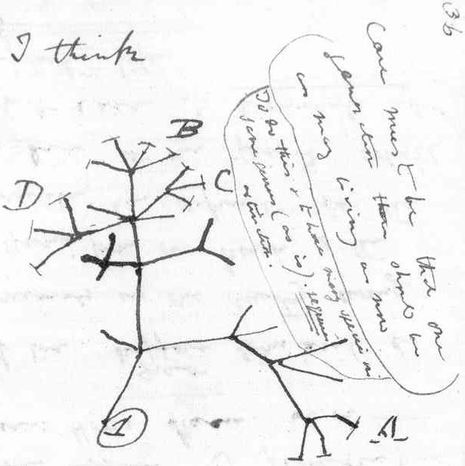The Limits of Science
Joshua Harris explores the philosophy of science, the history of thought, and the future of humanity through the paradigm of evolution.

Courtesy of innovations in science and technology, famines, plagues, wars, and infant mortality are now so low that most people living in economically developed countries expect to survive to old age, something which is unprecedented in the history of our species. Our modern society is able to avoid or survive diseases and wars far better than previous civilisations, but one of the final problems facing any civilisation is overextending the bounds of its resources - that is, running out of food.
Some farming practices, such as zero-till farming and applying fertiliser, are able to reduce nutrient losses, or spread them out over a larger area. However, in order to entirely eliminate nutrient losses from the food system, we would need to fertilise crops with our own faeces and dead bodies. Applying artificial fertilisers mined from rocks can help, but these will inevitably run out.
“Physiological evolution has in some cases come close to the limits of what is physically possible.”
Yet now, it seems as if even food production, the ultimate constraint on our survival, could be solved by technology. Bacterial cultures could produce food from thin air (or, rather, water), and be processed into substitutes for much of what we eat. We would still need to grow fruit and vegetables, but the amount of land required for this is tiny compared to what is required to produce animal products.
Is there any limit to what technology can solve? Thinking about the evolution of technology throughout history helps us address this question. Technology is a part of our cumulative culture, and there is a compelling argument that culture evolves by natural selection acting on memes, analogous to how organisms’ physiology evolves by natural selection acting on genes. In this sense, technological advances and scientific breakthroughs have little to do with individual people, but are to a large extent a product of the culture which these individuals experience. In support of this idea, there are many examples of convergent evolution. Agriculture arose at least 10 times independently. Calculus was formulated by Isaac Newton and Gottfried Leibniz around the same time. Big religions with just one or a few gods tend to evolve from animism and the worship of various spirits, wherever agricultural societies emerged from hunter gathering.
The various developments which eventually led to the iPhone may have been reliant on chance events. But if one of the inventors of Morse code, circuit boards, or miniature batteries had been run over by a bus before their big breakthrough, it seems highly likely that someone else would have made it in their stead, and the iPhone would still ultimately result. If Charles Darwin had never gone on the voyage of the Beagle, it is highly likely that someone else would have discovered evolution by natural selection. In fact, Alfred Russell Wallace did.
“We are not in any way ‘special’ compared to other creatures: we are all governed deterministically by evolutionary processes.”
Physiological evolution has in some cases come close to the limits of what is physically possible. Some trees have reached their maximum possible size. Our eyes can detect single photons. Dogs’ noses can detect single molecules. Similarly, there surely must be limits to technology and scientific discoveries. There is surely a finite amount which can be known about the world, and, like distantly related groups of animals under similar environmental conditions converge on the same ecotypes, we will eventually arrive at a given set of explanations for how things work. Evolution, or the laws of physics, exist, and were just waiting to be discovered. To a certain extent, the way in which we think about things is influenced by our language and our culture, but the principles of formal logic and mathematics upon which science is ultimately based are the same regardless of the language which we use to express our internal thoughts and the cultural biases which impact hypotheses.

If evolution, culture and even ideas always converge to common ground, we might reasonably ask: do our individual choices matter, or is everything predetermined? Arguably, our actions are strongly influenced by our values and general worldview, which is shaped by the culture in which we live, which is to some extent a product of biogeography. The general direction of society is modelled by the struggle for survival between different memes which infect our minds and propagate themselves as we transmit ideas to others. In this sense, perhaps we are not in any way “special” compared to other creatures: we are all governed deterministically by evolutionary processes.
However, what sets us apart from other evolved species is our ability to predict and manipulate the world. For example, physicists could predict that if you dropped a hammer and a feather on the moon, they would hit the ground at the same time, and when people went to the moon, they showed that this was indeed true. Hypotheses in complicated systems like ecology can never be proved definitively, but we can use statistics to discriminate the better theories from worse.
So, whilst our beliefs and values are just human constructs, humans have the remarkable ability of predicting phenomena which occur regardless of the cultural frames through which we perceive them. To quote the astrophysicist Neil deGrasse Tyson, “The good thing about science is that it’s true, whether or not you believe in it”. And, although recognising that our actions are to some extent predetermined can make life feel meaningless, I think it’s impossible to imagine a better existence than to be a conscious being in a world full of fascinating things.
 News / Colleges charge different rents for the same Castle Street accommodation2 March 2026
News / Colleges charge different rents for the same Castle Street accommodation2 March 2026 News / King’s hosts open iftar for Ramadan3 March 2026
News / King’s hosts open iftar for Ramadan3 March 2026 Theatre / Lunatics and leisure centres 4 March 2026
Theatre / Lunatics and leisure centres 4 March 2026 News / Angela Merkel among Cambridge honorary degree nominees27 February 2026
News / Angela Merkel among Cambridge honorary degree nominees27 February 2026 News / News in Brief: waterworks, wine woes, and workplace wins 1 March 2026
News / News in Brief: waterworks, wine woes, and workplace wins 1 March 2026








